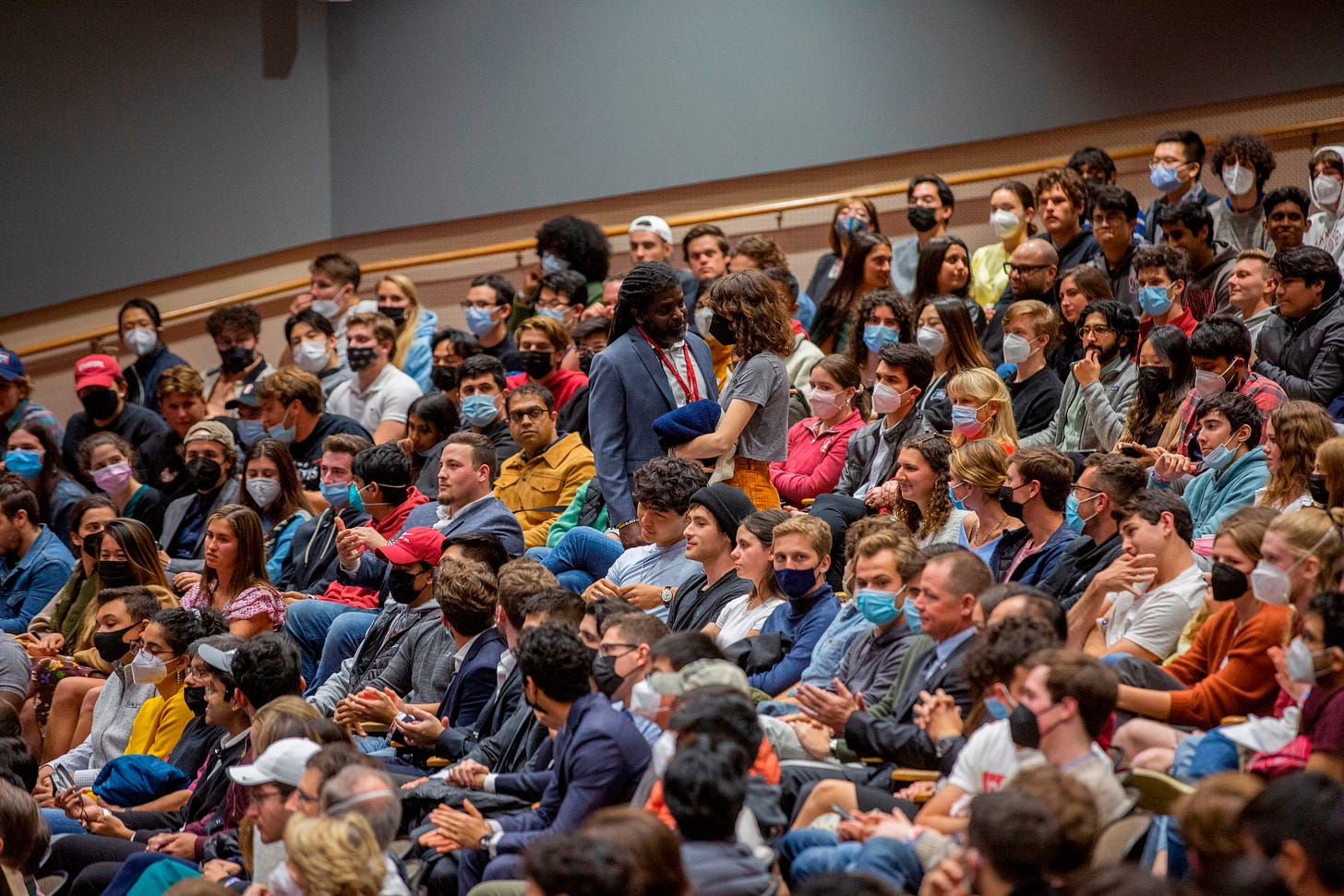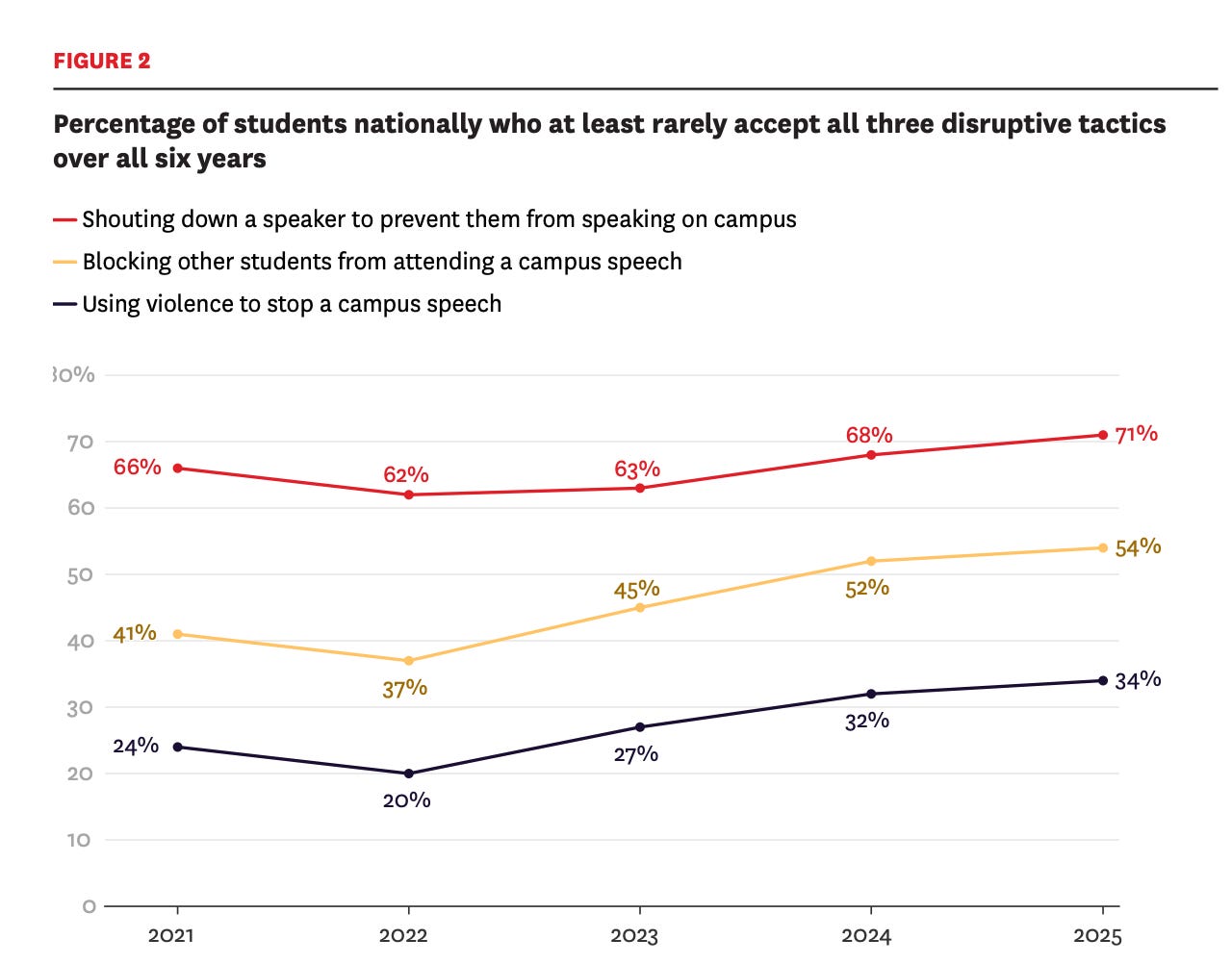College students increasingly believe violence is justifiable to stop speech
A new survey from FIRE shows one-third of college students are open to the use of violence to stop speech. That’s a crisis for higher ed — and for democracy.

For years now, our institutions of higher learning have exhibited dwindling student tolerance for opposing viewpoints, and this year is the worst yet. A new nationwide survey conducted by my organization, the Foundation for Individual Rights and Expression (FIRE), and College Pulse shows that 34% of college students believe that using violence to stop a campus speech is acceptable in some cases.
The findings, released yesterday, would be troubling at any moment in American history. But at a time when Washington is bent on seizing control of the U.S. higher education system, it’s imperative that students, led by their faculty and administrators, embrace the values of pluralism, debate, and curiosity that are necessary in a functioning democracy.
The data is grim. More college students than ever believe that, at least in some rare circumstances, it can be acceptable for their peers to engage in violence to stop speech they don’t like. This is extremely troubling, because violence in response to speech is how our culture of free expression — and the civil society it creates — begins to crumble completely. When it comes to violence, even “rarely” is too often.
A majority of students — cutting across both liberal and conservative ideological lines — oppose their schools allowing controversial speakers on campus. And more than two-thirds of students believe it’s acceptable for their peers to engage in the so-called heckler’s veto, shouting down a planned speech with the explicit intention of preventing it from being heard. In addition, more than half of surveyed students believe that physically blocking entry into such an event can be permissible.
These findings are alarming but, unfortunately, not very surprising. For one thing, this has been going on for a long time; FIRE has been issuing these surveys for six years, and each has produced more dispiriting results than the last. The data is also reflective of an overall polarization in our country and a calcifying antagonism toward perspectives that differ from one’s own.
Then, of course, there are the Trump administration’s attacks on higher education. The current government has targeted schools such as Harvard, Columbia, and Brown with threats to freeze federal funding if they don’t comply with its ideology on a range of subjects — including foreign policy and diversity programs. This only worsens an already tumultuous campus climate.
The stakes are high, and in circumstances like these, it’s no wonder that people become more tribal and closed off.
But deeper and more consequential implications are at play here as well. The preferences expressed by these students undermine principles that are not just foundational, but fundamental to higher education: open debate, free inquiry, and exposure to differing viewpoints. They are also the pillars of American civil society that are increasingly falling out of favor.
Nothing good can come from this — especially when violence is on the table.
Democracy requires deliberation and debate. It is premised upon the notion that no one person or group possesses the absolute truth, and as a result they should not possess absolute power or control. When we become so convinced that we are right that we are willing to use force rather than argument to impose our will upon others, democracy dies.
Our colleges and universities have clearly failed, and the results are all around us.
The good news is that in this case, the problem points directly to the solution: We need to rekindle truth-seeking and independent thought and remind both our students and our society that without free speech, neither of those things is possible.
This would go a long way toward restoring trust and faith in our institutions of higher learning — which, at present, are circling the drain. It would also serve as a healthy bulwark against the unconstitutional actions of the current administration, which has used the chaos on campus to justify its attempted nationalization of our universities.
The eyes of the nation are on American college students as they settle in for the fall semester, and for good reason: The future of higher education in this country and the foundations of our civil society may well depend on them.





Crazy coincidence that this article drops hours before Charlie Kirk is shot at a campus event...
I'm surprised at the fact that this has been on the increase since 2022. I had thought (and hoped) that the retreat from the high point in 2019-2020 was continuing. I would be interested to know if there are particular types of speech the students were most interested in stopping (I could imagine many different sides of the Gaza protests having wanted to shut each other down).
I'm a bit disappointed in this bit of writing though:
> Our colleges and universities have clearly failed, and the results are all around us.
>The good news is that in this case, the problem points directly to the solution: We need to rekindle truth-seeking and independent thought and remind both our students and our society that without free speech, neither of those things is possible.
I don't know what you mean by colleges and universities having failed! And I don't understand the claimed solution. What institution do you propose to replace colleges and universities with if you think we have failed? And what methods do you think would be able to "rekindle truth-seeking and independent thought" if you don't think colleges and universities can do that? And how does reminding society that free speech is necessary for those things generate any interest in truth-seeking and independent thought, or for free speech?